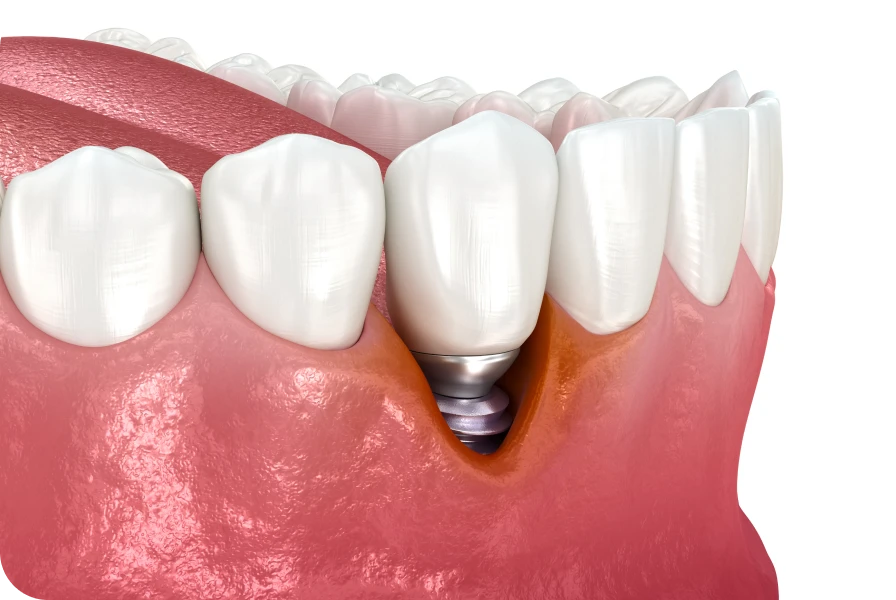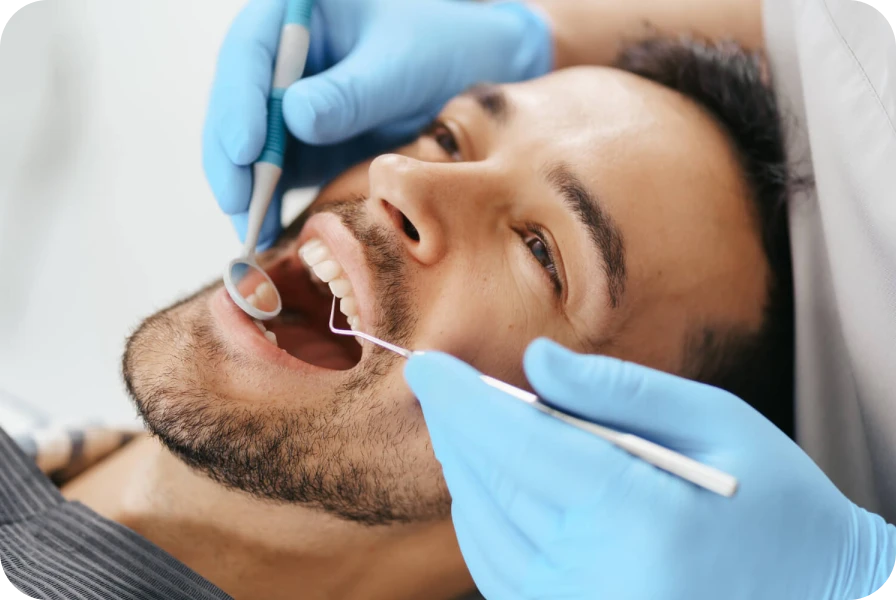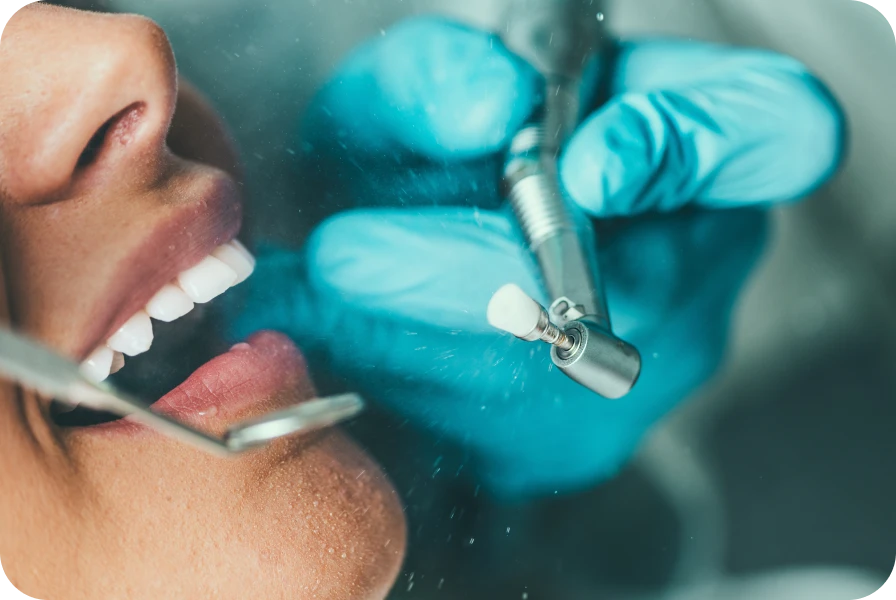Peri-implantitis
Understanding and Preventing Peri-Implantitis
Identify the Symptoms
Begin by carefully observing signs of inflammation around the implant. Redness, swelling, or frequent bleeding during brushing should immediately draw your attention. Regularly inspect your gums and surrounding tissues. If you notice increased sensitivity or pain around the implant, do not wait. Consult your dental surgeon promptly. Early detection helps prevent the situation from worsening.
Understanding the Causes of Peri-Implantitis

Peri-implantitis is often caused by an accumulation of bacterial plaque around the implant. This plaque, if not removed, causes inflammation that can lead to bone degradation. Poor oral hygiene or diseases such as diabetes also increase the risks. It is essential to understand these factors to better prevent peri-implantitis.
If you notice inflammation, do not neglect it. Apply the treatments recommended by your dentist, such as antiseptic mouthwashes or professional cleanings. Do not allow the inflammation to become established. Prompt action limits damage and protects your implants.
Follow your Dentist’s Recommendations
Adhere to the follow-up appointments scheduled by your dental surgeon. These allow for the verification of your implants’ condition and intervention before complications arise. During these visits, report any changes or discomfort, no matter how minor. Be proactive in monitoring your oral health.
Clean your implants like your natural teeth. Use a soft toothbrush and non-abrasive toothpaste. Soft bristles allow for cleaning hard-to-reach areas without damaging the gums. Floss or use interdental brushes to remove plaque between teeth and implants. Rigorous hygiene is your best defense against peri-implantitis.
Avoid Risky Behaviors
Do not smoke. Tobacco significantly increases the risk of peri-implantitis by impairing tissue healing. Limit alcohol consumption, as it can irritate the gums and weaken the immune system. Pay attention to your diet. A balanced diet promotes the health of tissues around implants.
Consult a Professional at the First Signs
If you experience discomfort or observe unusual signs, consult a professional. Do not delay consultation hoping that symptoms will disappear on their own. Early treatment can prevent more extensive interventions later.
The treatment for peri-implantitis depends on the severity of the condition. It may include a thorough cleaning of the infected area, antibiotic treatment, or even surgery to regenerate bone.
Diligently follow your dentist’s instructions. Rigorous follow-up is crucial for successful treatment. After treatment, continue to monitor your implants. Strengthen your oral hygiene habits.

Maintain a balanced diet and avoid risk factors such as smoking. Relapses can be prevented with consistent attention to your oral hygiene and regular communication with your dentist.
Monitor the Condition of your Gums
Choose specific toothbrushes for implants, interdental brushes, and dental floss. These tools are designed to clean effectively without damaging the implants. Ask your dentist for advice on the best products to use. Suitable accessories will help you maintain optimal hygiene.
Regularly examine your gums for any signs of redness, swelling, or bleeding. These symptoms may indicate early inflammation. Make it a habit to monitor the condition of your gums and act at the first signs of trouble. Increased vigilance can prevent serious problems.
A diet rich in essential nutrients supports the health of the tissues around the implant. Consume foods rich in vitamins and minerals to strengthen your gums and prevent inflammation. Avoid overly sugary or acidic foods that can irritate the gums. A healthy diet contributes to the longevity of your implants.
Educate Yourself on Peri-Implantitis
Educate yourself on the causes, symptoms, and prevention methods of peri-implantitis. The more you know, the better you can protect your implants. Discuss with your dentist everything concerning the health of your implants and the best practices to adopt. Good education is key to effective prevention.
If you suffer from diabetes or other chronic diseases, ensure they are well managed. These conditions can exacerbate the risk of peri-implantitis. Maintain strict control over your general health. By controlling your systemic diseases, you reduce the risks to your implants.
Maintain Regular Follow-Ups

Schedule regular visits with your dentist for professional cleanings and thorough examinations. Regular follow-ups allow for the detection of issues before they become serious. Remain committed to monitoring your oral health to ensure the longevity of your implants.
Be aware of the signs that may indicate complications, such as implant mobility or persistent pain. These symptoms must be taken seriously. Act immediately to prevent the situation from worsening. Do not merely react to problems as they arise. Adopt a proactive approach to oral health.
Incorporate healthy habits into your daily routine and follow your dentist’s advice. A proactive approach allows you to prevent complications.
Collaborate with your Dentist
Work closely with your dentist to develop a personalized care plan. Every patient is different, and your dentist is best positioned to guide you. Follow their recommendations and do not hesitate to ask questions to fully understand your treatment.
Before each appointment, make a list of questions you wish to ask. Be prepared to discuss your concerns and receive tailored advice. Good preparation allows you to make the most of your dental visits.
Research in implantology is constantly evolving. Stay informed about new techniques and updated recommendations. Discuss with your dentist how these advancements may apply to you. Good information allows you to benefit from the best practices for the health of your implants.
Do not wait for a problem to arise before consulting. Request regular evaluations of your implants, even if everything appears to be fine. Constant monitoring allows for the detection of problems before they become serious. Do not neglect the importance of regular check-ups.
Adapt your Habits According to Recommendations
If your dentist advises you to adapt certain habits, do so without delay. Whether it involves modifying your brushing technique or changing hygiene products, follow these recommendations to preserve your implants. Every piece of advice is important for the prevention of peri-implantitis.
Certain methods, such as gum massage, can help strengthen your gums. Discuss this with your dentist to determine if these practices are suitable for you. Healthy gum tissue is essential for keeping your implants in place.
Ensure that dental visits are part of your care routine. Do not consider them an obligation, but rather a crucial step for the health of your implants. Regular follow-ups are key to preventing long-term complications.
Adapt your Hygiene According to your Needs
Each patient has specific needs. Adapt your oral hygiene routine according to your dentist’s recommendations. Do not simply follow general advice, but personalize your care based on your situation.
By incorporating these simple steps into your daily routine, you can prevent peri-implantitis. Clean your implants carefully, avoid risky behaviors, and consult your dentist regularly.
Even with good hygiene, it is important to undergo professional cleanings regularly. These cleanings help remove plaque that you cannot reach with a toothbrush. Schedule these cleanings in agreement with your dentist.

Avoid Stress to Preserve your Implants
Stress can impact oral health. Find ways to manage daily stress to preserve your implants. Practice relaxation, sports, or other calming activities to reduce tension.
Oral health is linked to general health. Take care of your body as a whole to strengthen your immune defenses and protect your implants. Adopt a healthy lifestyle, with a balanced diet and regular physical activity.
Preventing peri-implantitis requires constant commitment. Stay motivated to keep your implants healthy. Keep in mind that every action counts towards preventing complications.
By following these recommendations, you maximize your chances of preventing peri-implantitis. Adopt a proactive approach, follow your dentist’s advice, and ensure rigorous oral hygiene. Prevention is key to ensuring the longevity of your implants and maintaining a healthy mouth.
